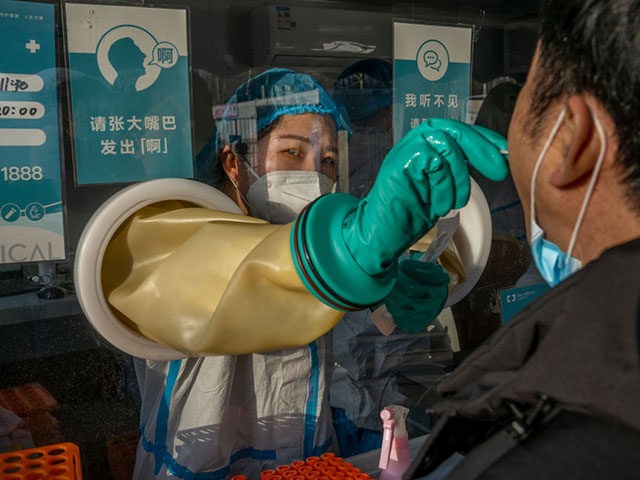Health officials in Tianjin, China — which has been locked down since January 9 — confirmed the detection of four new, locally transmitted Chinese coronavirus cases “caused by accidental exposure” to the virus inside a government-run quarantine facility on Thursday, the Global Times reported Friday.
The four coronavirus patients are all members of the same family. The first family member to test positive “was put under centralized quarantine on January 10” by local health officials.
“He was isolated until 14 days after his last exposure to the virus and received five rounds of nucleic acid tests, all returning negative results,” China’s state-run Global Times relayed.
“On Wednesday [January 26], however, the patient went to a fever clinic for treatment where he tested positive for coronavirus,” the newspaper reported on January 28.
Tianjin health authorities immediately forced three of the man’s relatives, presumably his immediate family members, into a municipal quarantine center and tested them for the Chinese coronavirus. Each of the individuals tested positive.
Chinese Communist Party officials prohibited all 15.6 million residents of Tianjin from leaving the city on January 9 after recording a significant uptick in the community’s Chinese coronavirus caseload. Tianjin government officials also imposed a limited lockdown on the city’s inhabitants on January 9. The restricted movement policy included three levels, “starting with lockdown areas where people are not allowed to leave their homes at all,” the state-run China Central Television (CCTV) reported. “In control areas, each household is allowed to have one family member leave to buy groceries every other day, while in prevention areas, people must remain inside their immediate neighborhoods.”
The mandates, which appeared to remain in place as of press time, were largely aimed to prevent Tianjin’s outbreak from spreading to neighboring Beijing, China’s national capital. Tianjin directly borders the metropolis of Beijing to its southeast, and it serves as a commuter launching pad for scores of workers who travel daily to the capital, mainly via high-speed train. A Chinese railway authority “suspended” all Tianjin-to-Beijing train ticket sales on January 9.
Chinese Communist Party officials have been especially eager to shield Beijing from Tianjin’s viral epidemic as the capital is set to host the 2022 Winter Olympics from February 4 to February 20. Olympic organizers have said they plan to create a “closed-loop” management system for the Games in which all Olympic athletes and staff are separated from Beijing’s local population in a theoretical bubble for the duration of the event. The separate Olympic ecosystem will include its own exclusive rail line in an effort to prevent infections of the Chinese coronavirus from spreading to Games participants. Beijing was scrambling to contain its own active Chinese coronavirus caseload of 75 infections as of January 26.

COMMENTS
Please let us know if you're having issues with commenting.